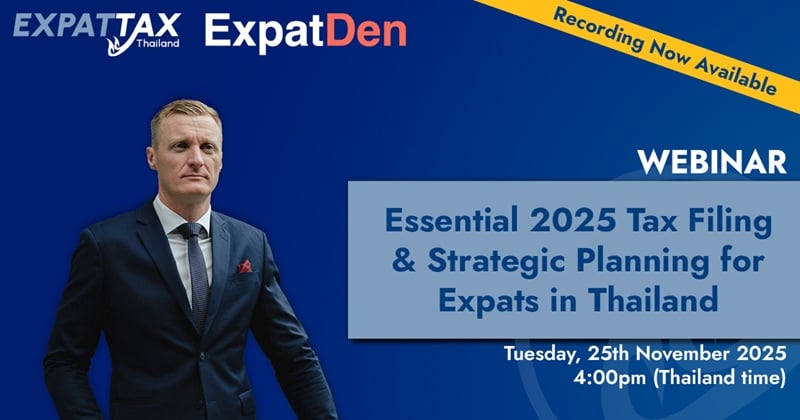
This article is based on our exclusive ExpatDen webinar for readers and subscribers on November 25th, 2025. The session was led by Carl Turner, co-founder of Expat Tax Thailand, who walked everyone through the essential 2025 tax filing rules for expats living in Thailand.
Carl and his team run a Thai accounting and tax filing company with more than 600 five-star reviews on Google and regulated by TFAC, the Federation of Accounting Professions. Their goal is to help expats understand Thai tax rules clearly and correctly.
"*" indicates required fields
Disclaimer: This article may include links to products or services offered by ExpatDen's partners, which give us commissions when you click on them. Although this may influence how they appear in the text, we only recommend solutions that we would use in your situation. Read more in our Advertising Disclosure.
Contents
- What This Session Covers
- Myths Carl Sees All the Time
- Quick Disclaimer
- Current 2025 Rules
- Who Actually Needs to File a Thai Tax Return
- What Is Not Taxable
- Tax Dates You Need to Know
- Using Double Taxation Agreements
- How the Revenue Department Tracks Information
- Real Examples Carl Shared
- Common Allowances and Deductions
- Carl’s Tips for Checking Your Situation
- Questions from ExpatDen Readers
- Final Message from Carl
- Need Personalized Advice?
(And How It’s Costing Them)
Most expats throw money away, get lost in red tape, and miss the local hacks that make life easier and cheaper. ExpatDen Premium gives you the secrets seasoned expats use to save, earn, and thrive beyond the basics, saving you thousands and opening doors you didn’t even know existed.
Here’s what’s inside:
- Housing Hacks: Slash your rent by 40% or more - because the locals are laughing at what you’re paying.
- Banking Mastery: Stop wasting on fees and get top exchange rates. Why give your money away?
- Healthcare for Local Prices: Quality treatment without the expat price tag.
- Visa and Legal Shortcuts: No more bureaucratic nightmares. Get the visa and residency secrets that others pay their lawyer dearly for.
- Deep Discounts: Find the savings locals rely on for groceries, dining, and more.
If you’re serious about making Thailand work for you, join ExpatDen Premium and make Thailand work for you.
What This Session Covers
Carl explained:
- The 2025 Thai tax rules
- Who must file tax returns
- What dates to remember
- What double taxation agreements actually mean
- Common allowances and deductions
- Tips for staying compliant
- Real examples from different countries
- Answers to questions sent in by ExpatDen readers
Myths Carl Sees All the Time
Carl started with the biggest misunderstandings people have:
- They think paying tax in another country means they don’t need to file in Thailand
- They think if they don’t have Thai income, they don’t need to file
- Digital nomads and retirees assume they’re automatically exempt
These ideas are not correct. If you are a Thai tax resident and you bring foreign-sourced income into Thailand, you may need to file a Thai tax return even if you already paid tax abroad. You may be able to use foreign tax paid as a credit, but that doesn’t remove the filing requirement.
Quick Disclaimer
All information presented is for general understanding only. Expat Tax Thailand has a full team of Thai accountants and consultants. Carl is the spokesperson explaining the rules, but you should get proper advice before acting on anything.
You can get personalized advice from them using this link.
Current 2025 Rules
The rules for the 2025 tax year are the same as 2024. As of 25 November, no changes have been announced regarding foreign-income remittance rules.
Earlier in the year there were signals from the Finance Minister about potential updates, but nothing official has been released.
Who Actually Needs to File a Thai Tax Return
Thailand has two main reasons you might need to file.
1. You Have Domestic Thai Income
This includes:
- Thai rental income
- Salary in Thailand
2. You Are a Thai Tax Resident and You Remit Foreign Income
You are a tax resident if you stay in Thailand for 180 days or more in a calendar year. Carl explained that “remit” simply means:
- Transfer money into a Thai bank account
- Withdraw cash from ATMs in Thailand
- Spend via Visa or Mastercard in Thailand when the money originates overseas
- Foreign-sourced income includes
- Overseas pensions
- Dividends
- Investment capital gains
- Rental income
- Property sale income
- Crypto gains
If you are a tax resident and you remit these into Thailand, you may need to file a Thai tax return.
What Is Not Taxable
Carl also explained what isn’t taxable in Thailand:
- If you stay less than 180 days in the year and remit foreign-sourced income
- If you bring in old savings from years when you were not a Thai tax resident
- Certain gifts and loans
- When you sell investments at a loss and only remit original capital
These can still be complex situations, so Carl recommends checking with his team if you are unsure.
Tax Dates You Need to Know
Thai tax year: 1 January to 31 December
Filing deadline: 31 March 2026 (for the 2025 tax year)
Expat Tax Thailand has a Thai Tax Guide for Expats produced with the Learning Institute for Everyone, a Thai university recognized by the Ministry of Education. You can download it free from their website. Their core business is online tax filing for all levels of complexity.
Using Double Taxation Agreements
If you paid tax overseas on income remitted into Thailand, you may be able to use that tax payment as a credit. You still must file a Thai tax return. A key point Carl made: double taxation agreements depend on where the asset is based, not your nationality.
Example: Carl is British. If he has a US pension and remits it to Thailand, he must look at the US–Thailand DTA, not the UK–Thailand DTA. Thailand has 61 DTAs. Many cover items like civil service pensions, US Social Security, and Canadian pensions.
Carl’s team has over 9 hours of DTA content on YouTube.
How the Revenue Department Tracks Information
Thai authorities now use:
- AI integration with Thai banks
- Data from the Bank of Thailand on inbound remittances
- Digital arrival card records showing your exact number of days in Thailand
- Common Reporting Standard data from 120+ countries, including account balances, interest, investments, pensions, and trusts
Penalties can be up to 200 percent of the tax owed plus 1.5 percent monthly interest. However, compliance is straightforward once you understand the rules.
Many expats receive letters asking for the source of remitted funds. These are not audits, only requests for information.
Real Examples Carl Shared
American Retiree
- Withdraws 1.5 million baht in Thailand via ATM and Mastercard
- Source: US 401k
- Stays 190 days
Result: Must file in Thailand and declare the pension; US tax paid may be used as a credit
LLC Dividends
Same conditions in Thailand. Must file and can use US tax paid as a credit.
British Pension, Not a Tax Resident
- Remits 2 million baht from a UK pension
- Stays 170 days
Not required to file in Thailand
British Pension, Tax Resident
- Same pension
- Stays 200 days
Must file and can use UK tax paid as a credit
Investment Capital Gains
- Married 65-year-old
- Sells shares worth 1.7 million baht with 40 percent gain
- Lives 190 days
- Taxable gain: 487,000 baht
- Estimated tax: 1,800 baht
Carl explained their calculation method: determine the remitted amount, divide by the gain percentage to find original capital, subtract to find the gain, then apply Thai tax brackets.
Common Allowances and Deductions
You can deduct:
- Personal allowance: 60,000 bah
- Spouse allowance if spouse has no income
- Child allowance
- Thai health insurance: up to 25,000 baht
- Additional 190,000 baht if you are 65 or older
Thailand’s tax system is progressive: the first 150,000 baht after deductions is tax free, the next 150,000 baht is taxed at 5 percent, increasing to 35 percent above 5 million baht.
Carl’s Tips for Checking Your Situation
Carl suggests the following steps:
- Count your days in Thailand. If 180 days or more, you are a tax resident.
- Check if you remitted foreign income.
- Identify which type of income you remitted.
- Check if a DTA gives you tax credits.
- List your allowances and deductions.
- File by 31 March 2026.
Expat Tax Thailand offers three levels of online tax filing and can also obtain TINs (Tax Identification Numbers) for clients who need them.
Questions from ExpatDen Readers
Why file if rules might change?
For 2025, no changes have been announced. If you remitted foreign income, you likely must file.
French pension mixed with savings?
Carl’s team uses year-end balances and First In, First Out to separate old savings from new pension income.
Australian age pension?
You likely must file. With age allowances, the tax owed may be low or zero, but the filing requirement still exists.
Military pension exempt?
If it is a US military pension, yes, it is usually exempt.
Roth IRA withdrawals?
If you are a tax resident and remit it, you must file and pay Thai tax, then claim it back in the US.
Final Message from Carl
Carl closed by reminding everyone that Thai tax can feel confusing at first, but the process becomes manageable once you understand the rules. If you want help, you can scan their QR code, book a free consultation, and talk with one of their English-speaking colleagues. They will happily walk through your situation with you.
You can watch the full record using this link.
Need Personalized Advice?
If you want to understand your own tax situation clearly, you can use this link to download Expat Tax Thailand’s free tax filing guide and book a personal consultation with their team.








